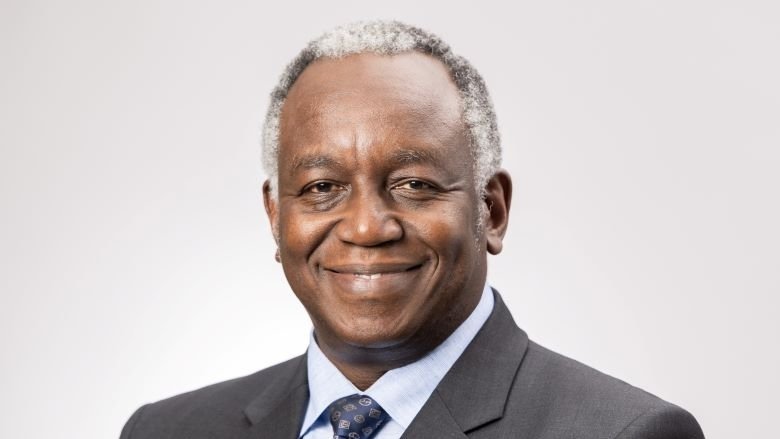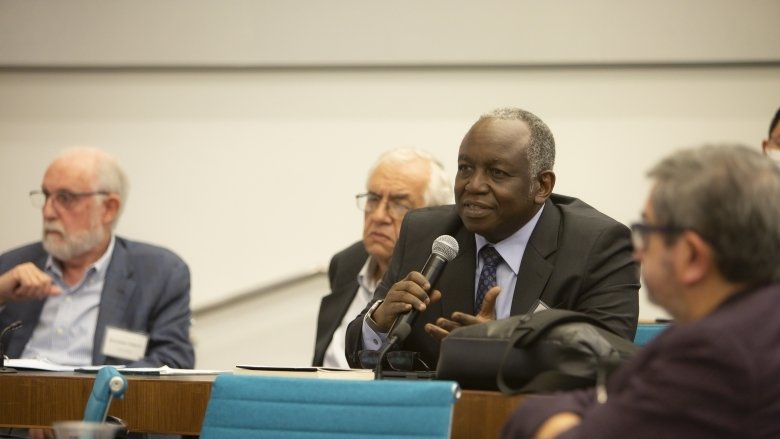Inspection Panel Member Ibrahim Pam reflects on his first months on the job
By John Donnelly
Late last year, Ibrahim Pam was selected to serve a five-year term on the World Bank’s Inspection Panel. He is the first Nigerian, third African, and 19th overall member of the Panel in its 30-year history.
Pam is an international lawyer and a criminal investigator, and has already led an independent accountability mechanism. He has worked at the Green Climate Fund, the African Development Bank, and the International Criminal Court. Yet when asked, in an interview with Accountability Matters, about a major lesson from his career, he mentioned his stint as a civilian peacekeeper in South Sudan and the Central African Republic in 2016, when he investigated alleged wrongdoings by peacekeepers.
The reason it was so important to him, he said, was that it connected him to his father.
His father, who died when Ibrahim was just four months old, had been a military peacekeeper in 1961 in the Democratic Republic of the Congo, which had won its independence the year before.
“It just spoke to me about the generational impacts of conflicts, of instability, of governance crisis, and, of course, of accountability,” he said. “And sort of what that means as a kind of heritage of service in troubled places.”
He continued: “Conflicts in Congo are still ongoing. I could have been deployed there, 55 years after my father was there. The fact that these conflicts have such longevity, lasting across generations … creates for me this disturbing question on how long does it take to resolve a crisis? That, to me, is the real tragedy of the story.”
It’s a tragedy, he said, that plays a role in how he approaches conflicts and disputes and the importance of making progress, even if incremental. Here are some other excerpts from an interview with Pam, who is now six months into his job as an Inspection Panel member:
How do you explain how your many varied job experiences fit together – from the anti-corruption commission in Nigeria and the International Criminal Court to the Green Climate Fund’s accountability mechanism?
I think that it shows that I have a lifelong commitment to working on accountability issues. This includes helping to set up an anti-corruption commission and working on anti-corruption policies in Nigeria, then working on international legal instruments and joining the International Criminal Court to focus on criminal accountability, and then having lots of field experience across Africa. I have kind of straddled these two worlds of working globally in anti-corruption and financial accountability and also locally and internationally on criminal accountability for mass crimes and genocide.
What was your perspective on the World Bank’s accountability process before you started with the Inspection Panel?
Clearly, the World Bank has a far more mature accountability mechanism in place, with the Inspection Panel starting 30 years ago as the first such independent mechanism among development banks. On my side, while for example I was at the Green Climate Fund setting up the Independent Integrity Unit, we built up a machine-learning, artificial intelligence system for risk identification. We hired a data engineer to put that in place, and he used World Bank data to develop that system because of the richness of data and the worldwide portfolio of projects available.
You joined the Inspection Panel last December. What are your first impressions?
Having worked at the African Development Bank and the Green Climate Fund, it’s great to come to the source of the river and see how it works. It’s very heartening to see the seriousness with which the entire organization regards accountability – including the Board, Bank management, the Accountability Mechanism and the Inspection Panel. Being part of this global institution that does so much good around the world, and seeing it from the inside, it has been great to be part of a process that holds up the mandate for accountability for World Bank projects.
Earlier in the spring, American University hosted an event that looked back at 30 years of the Inspection Panel’s impact, and also looked ahead to its future role. What are your takeaways from those discussions?
Ibrahim Pam, speaking at the Inspection Panel 30th anniversary event. Photo courtesy of the Inspection Panel.
I came away with a sense that there are huge expectations placed on the Panel. The history of it places a huge burden on the current members and Chair.
What I heard during the anniversary celebrations was an acknowledgement of how far the Panel has come, an acknowledgement of the values and the thinking that formed the Panel from the beginning. It was great seeing all the partnerships that went into forming it – the practitioners, the academics, and the activists.
There was also the sense of a critical review, with a goal of setting new objectives, widening the objectives. There was a lot of talk about remedy, discussions around the access of communities and individuals to the Panel, and new approaches and reform to make the Panel more accessible.
What was most important to you among those topics?
Two, maybe three, things. First, the question of access. It’s really important for us that we lower the barriers to access even further for the requesters – the communities or individuals filing a complaint. Some of that has to do with outreach, helping communities know what their options are. That is ongoing work that has to be done with a bit more vigor.
A second topic that really came through for me was that this system is built on partnerships and collaboration. It has to be so. The Panel cannot act alone. The Panel has to act closely in collaboration with civil society and academia, with Bank management – all the Accountability Mechanism’s stakeholders that are key to the process. The Panel is one player in a multistakeholder system. It is vital that we build that collaborative platform.
That platform involves other actors who are moving other parts of the accountability structure. Within management, there is the Grievance Redress Service, which manages a huge portfolio of grievance complaints that also delivers on accountability. The Dispute Resolution Service is part of the process to which the Panel belongs, and works toward finding resolution, finding an acceptable process of settlement of grievances and complaints. And the work that civil society does in an activist role, too. Everything works together. It was good for me to see the Panel’s role in the broader context.
And that will be influenced by the Panel’s history, right?
Yes, it’s very important to get the right historical perspective. Seeing previous Panel Members and Chairs, and seeing how this came about and how it is evolving, is important because it helps you project what it can be in the future. To me, that was very enlightening.


